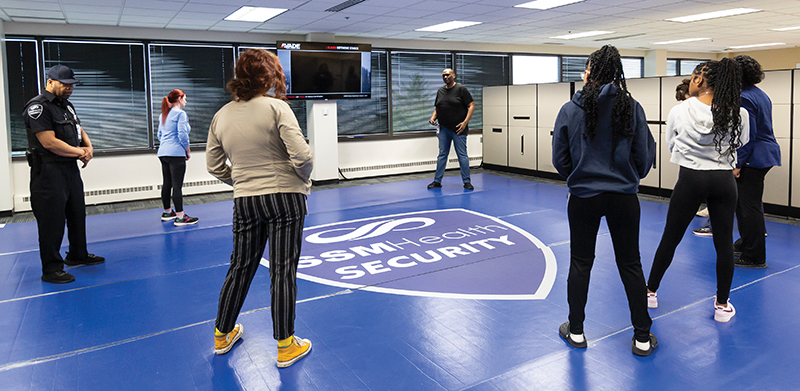
BRIDGETON, Missouri — Before SSM Health behavioral health nurse April Reitz joined her colleagues on a training mat to practice self-defense techniques, she smoothed a piece of red-orange painter's tape onto her right jawline.
The tape signaled to her group to avoid touching her there. Last year, a patient punched her in the face, dislocating her jaw, and she was still recovering.
Before the attack, Reitz said, "I never dreaded going to work." Now she does.
"But yet, I still feel a calling in my life, and I feel like God equips you to what he calls you to," she said. "And this is just a season I am working through — like, there's a lot to be learned."
Reitz and her colleagues gathered in March at the SSM Health Security Academy, part of a systemwide effort to improve security and reduce workplace violence in SSM Health facilities. The academy, housed in an office building near SSM Health DePaul Hospital in suburban St. Louis, opened in December 2022.
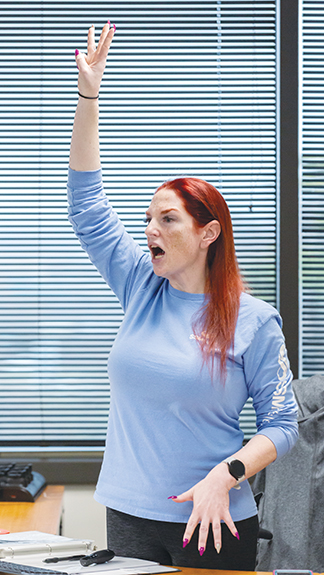
SSM Health, which has 23 hospitals in Missouri, Illinois, Wisconsin and Oklahoma, opened a similar academy in Madison, Wisconsin, in January. It plans to open another in late spring in Oklahoma City. Clinicians and security officers in Southern Illinois attend classes at the DePaul location.
An ongoing concern
Violence at health care sites is an ongoing concern. A 2023 National Nurses United survey of
914 nurses said more than eight in 10 saw or experienced violence in the last year. More than 37% of the nurses said they have reconsidered their job due to violence, and nearly 25% had changed jobs or left the profession.
Earlier this year, CHA and other professional groups wrote a letter in support of national legislation, the Safety from Violence for Healthcare Employees (SAVE) Act, which would provide federal protections for health care workers who are victims of violence in the workplace.
Just four months before the security academy near DePaul Hospital opened in 2022, a patient at the hospital stabbed and seriously wounded a nurse and a paramedic.
"Ten years ago, a hospital was a safe space, a sacred space, better yet, like a school or church and you didn't have to think about security to the level that we do today," said Todd Miller, SSM Health's system vice president of security. "Unfortunately, societal violence has changed. The expectations of people coming in have changed. And so we're having to adjust to that."
The academy is just one tool the system is using in response to workplace violence. Over the last two years, the system has added more weapons detection units, hired about 100 more security officers for nearly 500 total, and redesigned physical spaces to make them safer.
SSM Health says the efforts have been effective. Worker compensation cases related to workplace violence events dropped from 105 totaling $4 million in 2021 to 64 totaling $1.2 million through October 2023. In 2021, there were 413 reported "struck by patient" events across the system, 418 in 2022, and 326 in 2023.
The number of employee days away due to workplace violence has also decreased. They totaled 105 in 2021, 89 in 2022 and 82 in 2023.
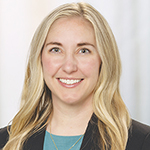
Seeking the best outcome
Housing academies in a fixed large space allows leaders to bring in clinical and security team members to train together, which is unique, said Aimee Anderer, director of the security academy near St. Louis.
"It was always clinical did their training and security did ours, but yet we go into a scene in a hospital room and we're all working together," she said. "Now, the right hand knows what the left hand is doing. We're one unit."
The academies include classroom space, a mock hospital room, a simulator where officers can train with actors on a screen, areas to practice with a Taser, a computer lab for report writing, and a large mat where security officers and clinicians can practice hands-on techniques.
The training varies depending on role and position. There are classes in report writing, trauma-informed care, self-defense and team defensive tactics. All the security officers carry Tasers. They need extra training to carry firearms. When the academy opened, 18 officers in the St. Louis area were licensed to carry firearms. Now, 42 are.
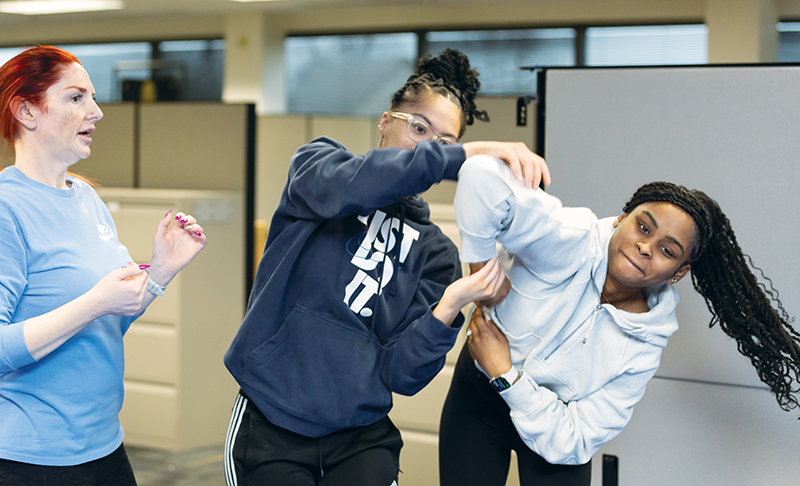
The focus of the training is on everything that can be done before having to touch someone who is posing a threat, Miller said. "If we can verbally de-escalate, that's the best outcome," he said.
Security leaders with SSM Health teach security staff and clinicians and that helps build rapport, Miller said. "The more you train with somebody, the more comfortable you are when you're in the real environment to work together successfully," he said.
SSM Health uses curriculum from AVADE Workplace Violence Prevention, which its website says is "designed to educate, prevent and mitigate the risk of violence to workers in healthcare and private corporations." The training covers proactive strategies to de-escalate and avoid issues to reduce risk of injury and prepares staff to be "ready, responsible and capable." In addition to seeking to prevent harm to all parties in any interaction, SSM Health uses "trauma-informed response" to be alert to any previous incidents that may be contributing to the actions of a patient or visitor.
Training at the academy
On a recent visit to the academy, Crystal Campbell, a security officer at SSM Health Cardinal Glennon Children's Hospital in St. Louis, ran through several scenarios on the simulator while Anderer watched.
She attended to get certified to carry a weapon.
Campbell responded to scenarios projected on a wall. In one in the hallway of a back office, two men opened fire. In another, she encountered a disgruntled, suicidal employee who had been fired and refused to leave. In a third, a man upset with a high hospital bill stood in the lobby and threatened to hurt himself with a knife.
She and Anderer then talked about how she handled each situation.
"I really appreciate you calling him 'sir' even though he's trying to kill you," Anderer said of the back-office scenario, in which Campbell shot the men who fired at her.
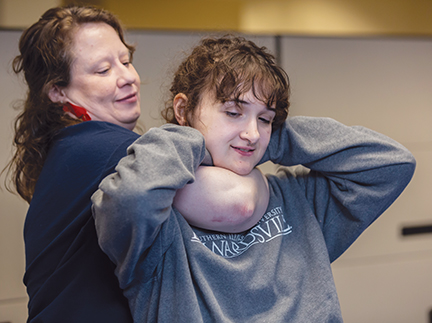
Campbell also ran through a scenario in the academy's mock hospital room, where trainer Tom Whyte, a security supervisor at SSM Health St. Joseph Hospital in St. Charles, Missouri, played the role of a patient who refused to leave. He was hungry and didn't have anywhere to go, he told Campbell.
"You can't stay here, Mr. Johnson," she said. "I can get some numbers for you. We can go back downstairs, and we can talk to the social worker. I can get you something to eat. But you have to get out of bed, and we have to go downstairs together."
He refused, and after a couple minutes of discussion, he put a knife to his own neck. She asked him repeatedly to put the knife down, and then deployed a training Taser. He dropped the knife, and the scenario ended.
Anderer debriefed Campbell afterward on her techniques and Campbell passed.
Campbell has a background in corrections and has worked with SSM Health for two years. She has visited the academy several times for training. The staff is warm and welcoming, she said, and she feels supported as an employee.
"They teach you what to do, what to expect," she said.
During another recent day at the academy, eight clinicians getting training on self-defense techniques first talked about defensive verbalization. Melisa Dare, an instructor who also works as a central intake assessor at DePaul Behavioral Health Urgent Care, had the group repeat "No!" "Stop!" "Get back!" and other phrases after her.
"Now, why do we do defensive verbalization?" she asked the group. "It creates witnesses. It establishes our authority. It keeps you breathing. When we get into fight, flight or freeze, that is where you are very apt to get tunnel vision. But by defensive verbalization you do keep yourself breathing and it fights off that tunnel vision. It may be used as a distraction. It alerts others of a confrontation. It provides direction to the aggressor. And it mitigates liability risks to both you and SSM."
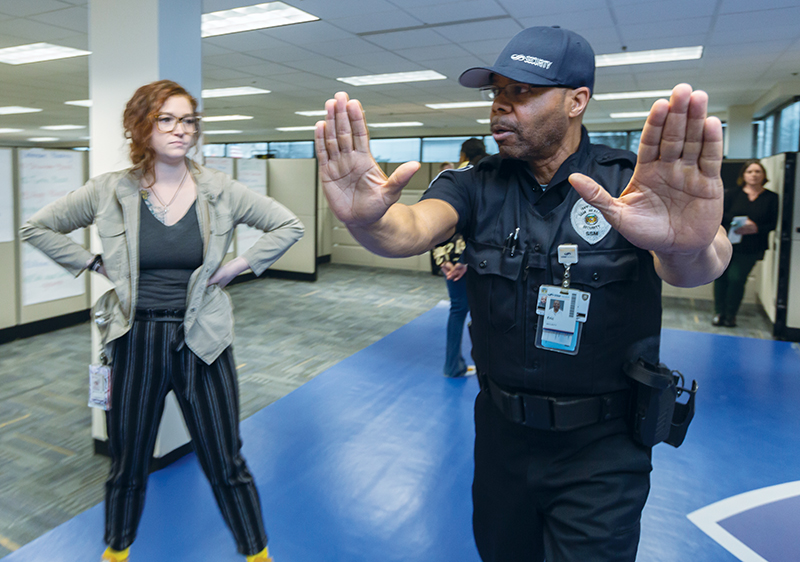
Over on the mats, Dare and security officer instructors Eric Visor and Marlos Woods used videos and hands-on instruction to show the group physical techniques: how to stand at a 45-degree angle to maintain balance and stability, how to move forward and backward, how to use distraction techniques, and how to push someone away.
Rhonda Childs, a regional ICU float nurse, said she appreciates that SSM Health provides the classes. "I think it's pretty good that we are getting to take a class that shows us how to properly not only defend and protect ourselves, but also remain aware," she said. "After 17 years, thank God I've never had to come in contact with anything like this, but this is still always good because you never know when it's going to happen."
